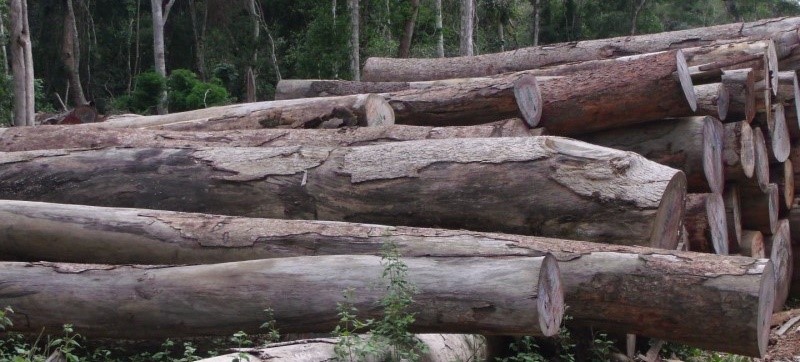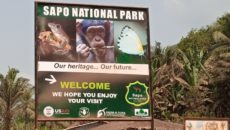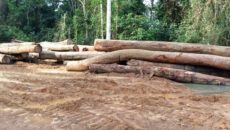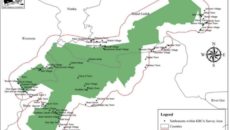BUCHANAN, Grand Bassa – Two stakeholder groups in the logging sector have accused the government of Liberia of violating the 2006 National Forestry Reform law by denying benefits to affected forest communities.
The accusation was made by the National Community Benefit Sharing Trust Board and National Union of Community Forestry Development Committee, which is the umbrella organization of the country’s 23 Community Forestry Development Committees. The forestry union was established in 2009 under the Forestry Law to represent the 280 affected communities and villages in the forestry concession areas.
The head of the union’s secretariat and national facilitator, Andrew Zelemen, told The Bush Chicken in an interview that communities affected by forestry activities are not receiving benefits due to the failure of the government and some logging companies to adhere to the Forestry Law.
Under the National Forestry Reform Law of 2006, specific monetary allocations and distribution of land rental fees must be paid out annually among three major parties, according to the following proportion: 30 percent for communities affected to concession activities under Forest Resources Licenses, 30 percent for county authorities, and 40 percent to the central government.
Zelemen said the government had not paid any fees from the time the law was implemented until 2015.
“Some of the companies started paying their land rental fees to the government, but the government did not pay a cent up to 2015,†he said.
Following the intervention of forestry groups and other partners in the sector, however, he said the government released US$2.662 million to the Benefit Sharing Trust Board for the affected communities for fees accrued from 2015 to 2017. Since then, the communities are yet to receive any further payments from the current administration.
“Unfortunately, since 2017 up to current, under the new leadership of this country headed by President George Manneh Weah’s [Coalition for Democratic Change]-led government, there has been no payment,†Zelemen said. “No payment has been made to [the] communities as [a] share of the land rental fees.â€
He disclosed that between 2017 to present, government and some logging companies currently owes the communities at least US$3 million. These contraventions of the law, he said, extend to government’s failure to keep the public informed by publishing and making readily available a single schedule of all forest-related fees, in plain language, as mandated under Chapter 14 of the National Forestry Reform Law of 2006.
Zelemen further said that some communities are now engaging into illegal actions, including attacks on company assets and roadblocks, in demand of past benefits owed, in addition to other grievances.
According to him, some of the companies affected are blaming their non-compliance on their inability to commence active logging operations since being granted permits. Without profitable operations, they claim, rental fees may be difficult to pay out.
“They have not been clear. Some of them are not operating at all, but they occupy the forest. What we have realized is that some of the companies do not have the adequate financial capacity to operate,†Zeleman said.
“There were some processes that we were not part of. So, we don’t know what mechanism the government has been putting into place before awarding these concessions, especially companies that do not have the capacity to operate and pay their land rental fees.â€
According to him, the Forestry Development Committee Union had petitioned the National Legislature in September to ensure that US$2 million of the US$3 million owed to the communities would be placed in the 2019/2020 national budget.
“We have also taken this matter up with the European Union-Liberia Voluntary Partnership Agreement stakeholder’s gatherings, including the Joint Implementation Committee meetings, the National Multi-Stakeholders Committee meetings; yet still, we have got [no] redress to our plight despite the involvement of our international partners through consultation at various forestry stakeholders’ meetings,†the group said in its September petition.
For his part, Matthew Walley, who serves as co-chair on the National Community Benefit Sharing Trust Board, has told The Bush Chicken that the government lacks the political will to release the benefits, despite payments being made by the companies.
Walley said the action of the government is a serious disappointment to the communities. He threatened that the board would prevent the companies from further operating if the government cannot make the benefits available.
“We are [sending] this out that if the government wants to be popular among the affected community people, these are the people that are crying. They love this government so much. So, we are appealing to the government to pay the 30 percent share to the communities,†he said.
The manager of the E.U.’s Non-State Actor Project at VOSIEDA, Abraham Billy also acknowledged the complaints of affected communities, including on non-compliance and the presence of illegal logging activities without any remedy.
“The fact that the government is not relaying to the communities its portion, it means the government is also not in compliance of the law,†he said.
Meanwhile, an official of the Forestry Development Agency has assured that affected communities would be paid their benefits. Jerry Nyumah, who is the technical manager for commercial forestry, said the agency is currently in discussion with the legislature to include monies owed to the communities in the next budget.
“Efforts have been made even at the multi-stakeholders’ level. The communities got some money during the administration of President Ellen Johnson Sirleaf, but efforts are being made so that they can get their benefits,†Nyumah said.
He insisted that “it is not that the government is not willing, but you know when the new government comes into office, the government officials have to know what have been going on in the office, and so these are the processes that are ongoing.â€
Nyumah said he was “sure, very soon something will be done.â€
In this case, the affected communities complained that they have not been able to receive their benefits annually, and no information has been given to the public as the law requires.
These fees, they insist, are crucial to their livelihood and the various community development projects they undertake, including the construction of schools, clinics, vocational training centers, road rehabilitation, guest houses, and community halls among others.
They warned that further delays in payment of their just benefits could lead to more radical actions.
Featured photo by the Forestry Development Authority



